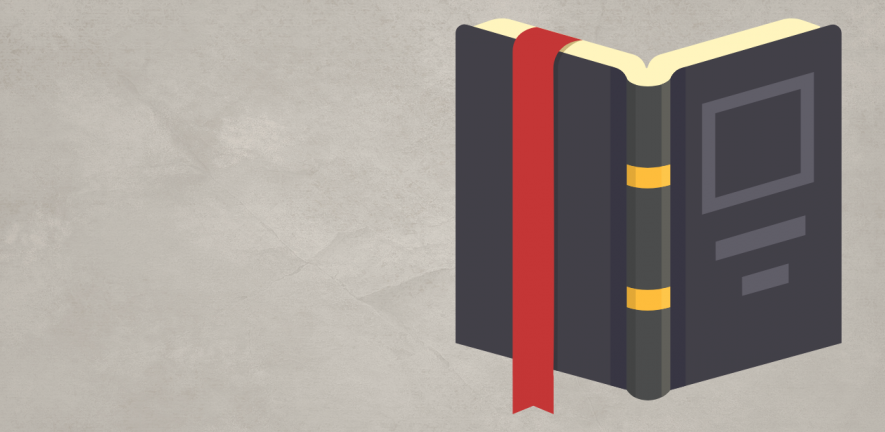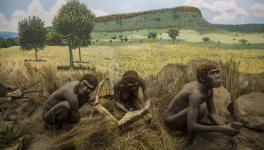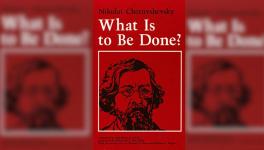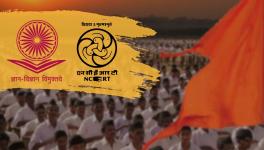Erasing the Past, Blinding the Future

Representational Image.
The National Council of Educational Research and Training (NCERT) has recently released a new set of textbooks for middle and high school students. The new ‘edition’ of textbooks has deleted chapters on Mughal history and this raised a storm. History does not exist for the liking and disliking of individuals, it just is. It exists for us to learn from. If it offends someone, even better. Because then one is less likely to repeat it.
—
Every generation has the right to interpret history.
Historiography has undergone many transformations. Western historians saw history in a linear fashion— in which man went from being a caveman to a post-modern one. Thus, according to Western historians, history is a progressive journey from one stage to another.
Others have doubted this narrative: they have pointed out the fall of mighty empires, like the Egyptian and the Roman, the Mayan and the Aztec ones. Some have noted the ups and downs of history, from the mighty Roman Empire to the Dark Ages. Many have seen history as a string of dynasties, kings, queens and emperors. This is the most popular form of teaching history— full of individuals, dates and events.
Marxist historians did not see history from top-down, but from bottom-up. To them, individuals don’t change the course of history; movements do. They began seeing history from the point of view of the common man. They tried to discover the voice of the voiceless, the face of the faceless. In such histories, the Great Pyramids of Egypt and the Pharaohs were not important. What was important were the people who built the pyramids; the technology, the science and the mathematical precision which was used to build a wonder of the ancient world.
The issue is about the consequences of such deletion of our history— a history which is not only glorious, but also continuous.
However, it is one thing to interpret history, another to erase it from textbooks.
The National Council of Educational Research and Training (NCERT) has recently released a new set of textbooks for middle and high school students. The new ‘edition’ of textbooks has deleted chapters on Mughal history; this raised a storm.
The issue is not about the competency of the NCERT to change the contents of the syllabus. The issue is about the consequences of such deletion of our history— a history which is not only glorious, but also continuous.
Why do we study history?
Before masking parts of our history, the NCERT should have asked a few important questions: why do we study history? What would be the consequences of erasing parts of our history? Would such deliberate gaps enlighten our citizens? Would the elimination of a certain period of history strengthen or weaken our nation? If the goal of the government is to strengthen the nation, to ensure “sabka saath, sabka vikaas”, then the deleting of our history is a self-defeating proposition.
History is taught not to burden students, but to enlighten them. Firstly, it is essential to know where we come from. Mankind is not only forward looking, but also backward looking. Jamaican political activist. Marcus Garvey said, “A people without the knowledge of their past history, origin and cultures is like a tree without roots.”
It is imperative for children to know about the trials and tribulations, and the triumphs of our past. Where did we come from? How did we develop as a people, as a society and as a nation? Where are we going? British statesman, soldier, and writer Sir Winston Churchill was not wrong when he said, “The farther backward you can look, the farther forward you are likely to see.” Thus, the knowledge of history places us in a time capsule.
Secondly, it teaches us about our own country and culture. Where did the caste system come from? How did the Sanathan Dharma grow? When did the Bhakti movement begin? Why are North and South India so different? What are the origins of the different languages in India? Where did different communities, such as the Muslims, the Parsis, and the Christians come from? How and when did Jainism and Sikhism emerge? What are the different customs in the country? What prompted these customs to be created? History runs into sociology and anthropology, philosophy and the arts, literature and linguistics. It tells us who we are and why we are the way we are.
Thirdly, history teaches us about the mistakes and mishaps of the past. We learn about the horrors of the Holocaust, about the catastrophe of the atomic bomb. As Spanish–American philosopher, essayist, poet and novelist George Santayana said, “Those who cannot remember the past are condemned to repeat it.” German philosopher, author, social theorist and economist Karl Marx also reminded us, “History repeats itself: first as a tragedy, second as a farce.” Hence, lessons of history guide us to avoid the pitfalls of the past.
Fourthly, history reveals the plurality of the world around us. It tells us about different cultures and civilisations, different concerns and solutions; it reveals the reasons for the way the people are. We learn about the Greek and Roman civilisations, about their emphasis on rhetoric and scientific temper, about their tragic plays and democratic city-States. We see how different sets of people have tried to solve the problem of widows in their society. While the Christian world assigned their widows to the nunneries, the Islamic world permitted them to re-marry; we assigned them to the flames, or to the temple towns. Human problems form a common denominator in different times and places. Instead of reinventing the wheel, we learn from others’ solutions.
Why do we study history? What would be the consequences of erasing parts of our history? Would such deliberate gaps enlighten our citizens? Would the elimination of a certain period of history strengthen or weaken our nation?
Fifthly, history opens our world vision; we become more accepting of other cultures, of their value systems, of their lifestyle. Once we remember that Islam was born in the harsh desert of Arabia, we can appreciate certain Islamic traditions: of eating together— lack of water did not permit them to have utensils for each individual; their love for the green colour— green in the desert symbolised life; their love for fountains and flowing water in their gardens— water was life, water was paradise.
Sixthly, the study of history cultivates the habit of looking at a fact from multiple points of views. The same fact may have different interpretations: the events of 1857 in Northern India are called a “mutiny” by the English. Yet, for us, it is the “first war of independence”. Mutineers suddenly turn into freedom fighters. Similarly, the Japanese–American conflict during the Second World War has two different and opposite interpretations, depending on whether one is reading Japanese history, or the American one. History, thus, builds analytical and interpretive skills in students.
Seventhly, history reveals human character. It unveils the good, the bad and the ugly; the brave, and the cowards; the tenacious and the laidback. We meet the wandering ascetic and religious teacher, Gautama Buddha, who founded Buddhism; the 24th tirthankara of Jainism, Mahavira; the founder of Sikhism, Guru Nanak; and Hindu monk, philosopher, author and religious teacher, Swami Vivekananda. We also learn about Austrian-born German politician Adolf Hitler; and Soviet politician, political theorist and revolutionary Joseph Stalin. We admire the wisdom of the Ottoman emperor Suleiman the Magnificent, the bravery of the Kamikaze pilots, and the cowardice of the military general Mir Jaffar, the first dependent Nawab of Bengal of the British East India Company. As Athenian historian and general Thucydides said, “History is philosophy teaching by examples.”
Eighthly, indeed, history provides us with a philosophy of life. Despite the wars and mayhem, despite the famine and pandemics, the natural calamities and harshness, mankind has survived for over two millennia. It gives us hope and experience, wisdom and vision. We learn about life from the myriad characters we meet in history. Mahatma Gandhi once said, “When I despair, I remember that all through history, the way of truth and love has always won. There have been tyrants and murderers and for a time they seem invincible, but in the end, they always fall— think of it— always.”
Ninthly, history imbibes a confidence in the individual and in the society. Knowing about our past achievements and triumphs strengthens our sense of self-identity. In Japan, children are taught that they are descendants of the Sun God, the inheritors of the Samurai culture. When the Japanese lost the Second World War, a correspondent asked a Japanese person how it felt to be defeated by the Americans. He said, “Give us twenty years, and we will defeat the Americans.” Within twenty years, the Japanese economy was ahead of the American one. Unfortunately, we don’t teach our children that we may be a young nation, but we are the oldest civilisation on Earth.
Lastly, confident persons become good citizens. They take pride in their nation, in its institutions, in its culture and heritage. Since a sense of national pride is lacking, we as people bemoan our achievements. We don’t appreciate the great strides India has made in the last seventy-five years. We have, thus, become a country of cynics and pessimists. Like an individual, if a nation loses hope and vision, it can never rise above the ordinary.
The deleterious effect of deleting history on the unity of our nation
Unfortunately, the deletion of history, even of its parts, robs our kids of all the benefits of studying the subject. Moreover, if the history of a particular community is deleted, it leads to dangerous consequences. The community becomes rudderless— without a sense of belonging, without a sense of mooring. It would feel that it is being reduced to being second-class citizens.
History runs into sociology and anthropology, philosophy and the arts, literature and linguistics. It tells us who we are and why we are the way we are.
Further, by erasing the history of a particular community, its identity is whipped out. The majority community can easily be led to believe that the particular community is insignificant. While it would lead to the tyranny of the majority, it would equally lead to the ghettoisation of the minority. In such a scenario, the minority community feels insecure and frightened. Such a divide leads to clashes between the two communities. Instead of strengthening the country, such disturbance and disruption would weaken us.
Furthermore, we end up repeating the mistakes of our history.
It is a misnomer that the English followed a policy of ‘divide and rule’. In fact, throughout our history, from the Greek invasion to the Chinese one in 1962, we were conquered because we were always divided. Unlike the Germanic tribes that fought as a single entity against the Roman armies, in India, a single caste fought the invaders. When the majority of people stood as mute witnesses, the martial caste could not endlessly succeed in warding off the invaders. Divided, we fell. Therefore, even today, division on sectarian lines would only weaken us further.
We are refusing to learn from the great teachers of the past. Curiously, in a history of five thousand years, we have given the title of “the Great” to only two emperors: Ashok and Akbar. Surely, there was no dearth of great kings and queens. After all, we can boast of the Chalukyan, Pallava and Chola Kings.
But why have we called only Ashok and Akbar great? Because they faced the same problem of sectarian division in their times as we do today. During Ashok’s period, the country was divided between the Hindus and the Buddhists. Both communities were at loggerheads. During Akbar’s reign, a minority community was trying to rule over a vast majority. The problem before both the emperors was the same: how do I unite my people? Both spoke of fusion. The former spoke of “dhamma”, the moral duty of the people towards each other. The latter promoted “Ganga-Jamuni Tehzeeb”— the fusion of the Hindu and the Muslim civilisations.
History reveals human character. It unveils the good, the bad and the ugly; the brave, and the cowards; the tenacious and the laidback.
Assimilation is the hallmark of our civilisation. Unlike the Western civilisation, we never believed in extermination. We believe in the confluence, and not the clash of, civilisations. Thus, we readily accepted different cultures and communities, religions and philosophies as our own. This is the foundational principle for our survival and progress as a lasting civilisation on Earth.
Those who think otherwise should remember, “United we stand, divided we fall.” Our history as a nation has proven this saying ad infinitum and ad nauseam. Yet, tragically, we fail to comprehend and understand this simple historical truth.
History is not there for you to like or dislike. It is there for you to learn from. And if it offends you, even better. Because then you are less likely to repeat it. It is not there to be erased. It belongs to all of us.
Justice Raghvendra Singh Chauhan is a retired judge, having served as Chief Justice of the Uttarakhand and Telangana High Courts, and as a judge at the Telangana, Karnataka and Rajasthan High Courts.
Get the latest reports & analysis with people's perspective on Protests, movements & deep analytical videos, discussions of the current affairs in your Telegram app. Subscribe to NewsClick's Telegram channel & get Real-Time updates on stories, as they get published on our website.
























